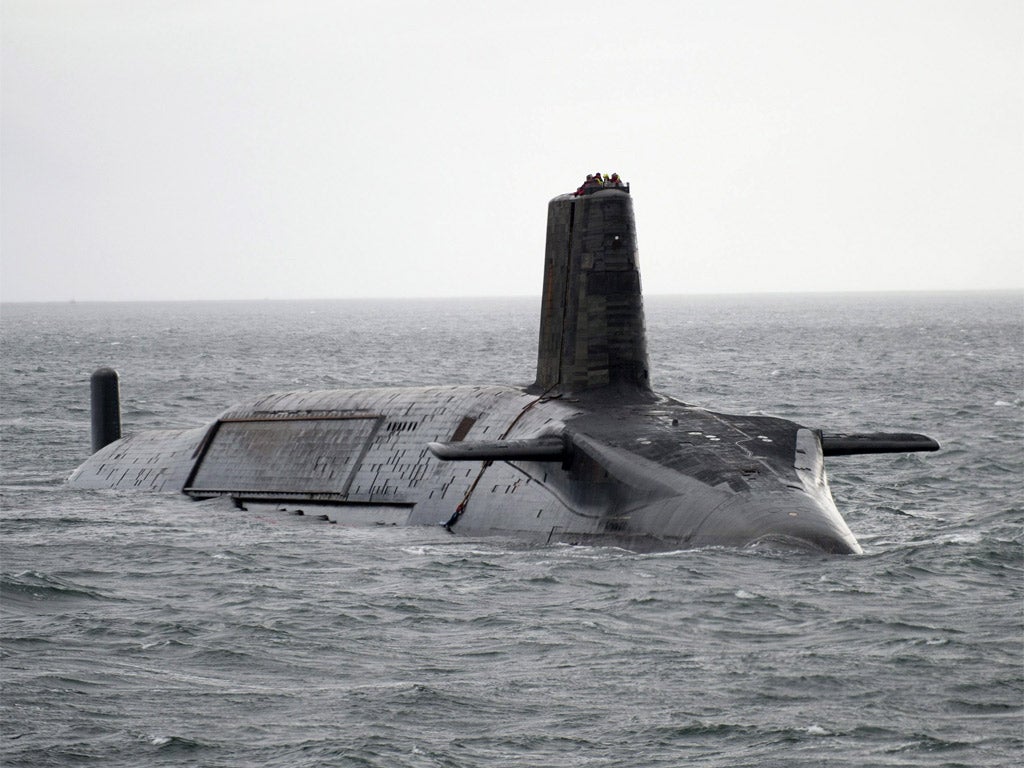Dead in the water: MoD shake-up plans ditched
The Government's project to 'privatise' the £15bn defence agency that buys the armed forces' tanks and submarines is shelved

Your support helps us to tell the story
From reproductive rights to climate change to Big Tech, The Independent is on the ground when the story is developing. Whether it's investigating the financials of Elon Musk's pro-Trump PAC or producing our latest documentary, 'The A Word', which shines a light on the American women fighting for reproductive rights, we know how important it is to parse out the facts from the messaging.
At such a critical moment in US history, we need reporters on the ground. Your donation allows us to keep sending journalists to speak to both sides of the story.
The Independent is trusted by Americans across the entire political spectrum. And unlike many other quality news outlets, we choose not to lock Americans out of our reporting and analysis with paywalls. We believe quality journalism should be available to everyone, paid for by those who can afford it.
Your support makes all the difference.U-turns don't get any bigger than this. Philip Hammond, the Defence Secretary, wanted to hand the private sector £15bn a year to buy the armed forces' guns, tanks and submarines. He argued that introducing this commercial nous would give the Ministry of Defence more things that go "bang" for its buck, theoretically eliminating around £2bn a year in bureaucratic waste.
Mr Hammond faced down unions that feared thousands of job cuts, and Pentagon officials who thought officials had taken leave of their senses.
But his dream of semi-privatising the Bristol-based Defence Equipment and Support (DE&S) gradually fell apart. Yesterday, he admitted there was no commercial sense in pursuing what is known as the "GoCo" – government-owned, contractor-operated – model after only one consortium, led by the US giant Bechtel, remained interested in running the programme. A team led by Bechtel's rival CH2M Hill pulled out last month, removing any competition in the bidding process.
The embarrassing climb-down followed a series of articles in The Independent and its sister papers that revealed deep potential conflicts of interest among the companies that considered bids to run the GoCo body and highlighted the risk that commercial gain could have overridden national interest.
The companies running DE&S would have had the power to hand contracts to defence groups that were their clients in other sectors or areas of work. For example, the second member of Bechtel's team, PricewaterhouseCoopers, audits the accounts of companies such as Cobham, which makes helicopter antennas and counter-explosive devices, and would also have been able to award them lucrative contracts. The final company in that consortium, PA Consulting, has worked for BAE Systems, the MoD's biggest supplier.
Questions were also raised over what would happen if a company that ran DE&S also had dealings with a country with which the UK was at war. Insiders at the agency wrote to this newspaper condemning the "despicable plans to pimp out defence procurement".
Facing Vernon Coaker, the bulldog of a shadow Defence Secretary, in the House of Commons, Mr Hammond conceded defeat yesterday, adding that the whole fiasco had cost the taxpayer £7.4m. Thus a plan to save billions had actually cost millions with no end result bar an alternative proposal that Mr Coaker argued could "make things even worse" than a GoCo.
DE&S-Plus, as it is known, will be a "bespoke central government trading entity from April 2014". This means the agency will have greater independence from the MoD, with freedoms to recruit who it wants and to decide how much it can pay them.
Remarkably, the GoCo's grand architect, the former defence journalist and magazine publisher Bernard Gray, will become the first chief executive at DE&S-Plus.
Industry sources had felt sure that Mr Gray was either for the chop or would resign after the GoCo's failure. Instead, he will run an organisation with a budget "bigger than many FTSE 100s", as an industry source puts it.
The insider warns that DE&S-Plus could even turn out to be a "bigger reform than GoCo [as the] CEO has more power". That is because the companies running a GoCo would have been subject to more checks and balances, and faced greater media scrutiny, than a handful of increasingly powerful servants of the crown. That said, the structure of the revamped organisation is not yet clear. And Mr Gray will still be answerable to Parliament and work under what Mr Hammond calls an "independent chairman".
But however DE&S-Plus is eventually structured, the fact that it will remain in the hands of the state is an overwhelming defeat for Mr Hammond. Only this summer an official close to the process said that it was "hard to see" how internal improvements could "compete" with the benefits a GoCo could provide.
Mr Coaker's taunt of the minister says it all: "Not so much GoCo or DE&S plus as NoGo and D minus for you."
Join our commenting forum
Join thought-provoking conversations, follow other Independent readers and see their replies
Comments